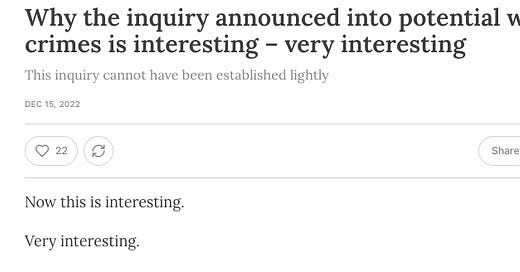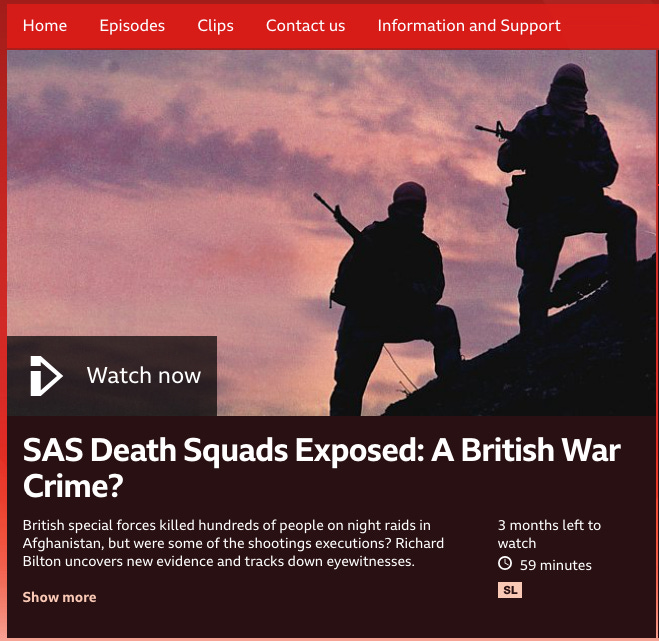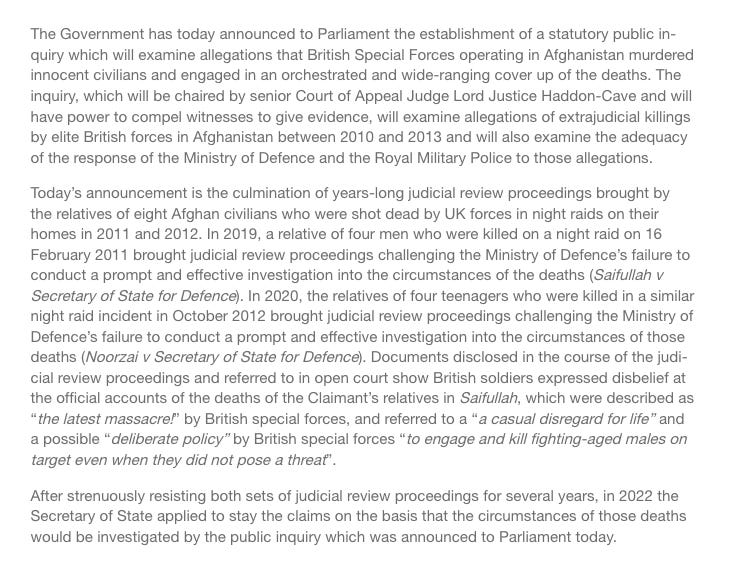The curious incident of the Afghanistan war crimes statutory inquiry being set up
It may be becoming obvious why the government set up this inquiry rather than using its usual tactics of denial or derision or deflection of serious allegations
Back in December 2022, this Substack picked up on something odd.
Click here to read that post.
Joshua Rozenberg picked up on the strange development - and he also was kind enough to say that my observations were shrewd.
And now it may be becoming more obvious what is behind was seemed such a remarkable move by the government.
*
The extraordinary thing that happened was that the government suddenly set up a full statutory inquiry into alleged war crimes by the SAS in Afghanistan.
Generally the government does not like setting up such inquiries, regardless of how bad things look.
For example, there still has not been a statutory inquiry into what happened at the Deepcut barracks, and the inquiry into the war crimes in Iraq in respect of Baha Mousa was only set up grudgingly and with narrow terms of reference.
*
But here something seemed very different.
Something had happened, something had come to light - even if not (then fully) in public view.
For the government to announce a statutory inquiry under a highly regarded judge with full powers to obtain evidence requires an explanation.
It is difficult to overstate what an unusual thing this was to happen.
*
At first glance, there was not a lot in the public domain to go on for why the inquiry was set up.
For example, an outstanding edition of Panorama had indicated there may be a serious problem which needed addressing - but a close watch of that programme did not offer any conclusive substance.
Of the four named individuals in that programme who gave a studio interview, three were knowledgable only about what happened with Australian special forces, and the fourth was a former British military commander who rightly expressed his concern if - if - the allegations were true. Another couple of interviewees gave information anonymously, but even that material did not get very far.
(Looking back at the programme, one can see how careful and skilful the programme-makers were with the then available information and with what they could broadcast without undue legal exposure.)
*
What the programme did excellently was to show how the formal explanations for certain incidents simply did not add up.
But asking hard questions is not the same as incriminating evidence of the likely answers.
As powerful as the Panorama programme was, it was unlikely - in and of itself - to trigger a full public inquiry.
There therefore must be another explanation.
And if you looked carefully, the reasons for an inquiry were more apparent.
For example, here is a press release for some of the barristers working on a related case:
The key passage here is:
“Documents disclosed in the course of the judicial review proceedings and referred to in open court show British soldiers expressed disbelief at the official accounts of the deaths of the Claimant’s relatives in Saifullah, which were described as “the latest massacre!” by British special forces, and referred to a “a casual disregard for life” and a possible “deliberate policy” by British special forces “to engage and kill fighting-aged males on target even when they did not pose a threat”.
“After strenuously resisting both sets of judicial review proceedings for several years, in 2022 the Secretary of State applied to stay the claims on the basis that the circumstances of those deaths would be investigated by the public inquiry which was announced to Parliament today.”
*
This documentary evidence is in fact mentioned (though only in passing) in the programme
But if such evidence exists then we move on from just hard questions towards awkward answers.
In essence: it would appear from correspondence that formal accounts of the incidents were not believed at the time.
And when there is correspondence there are correspondents.
The question thereby becomes who knew what and said what, and how senior were those who either did not believe the official story or accepted implausible official stories without scrutiny.
Here we can look at the impressive and comprehensive online database put together by Professor Sam Raphael, from information in the public domain or referred to in open court.
First, here is a list of the incidents.
And second, here is a documentary record of who knew what and so on.
When you look at this material it becomes apparent that there was a sense at the time and at senior levels that not only the explanations for the incidents did not add up, but that something unethical and unlawful was happening.
In essence: there was a belief and understanding at senior levels in the British military that unarmed and detained prisoners were routinely being executed and that this was then being covered up.
*
If - if - this serious accusation was true (and few of us will know) then, of course, this would accord with what was proved in respect of what Australian special forces at the same time, as set out in the Brereton Report.
That report stated:
Against this finding of 39 victims in respect of Australian special forces, the Panorama programme “identified 54 people who were killed by [one] SAS squadron in suspicious circumstances, and this is just one unit in one six-month period”.
*
Of course, there will be pushback against such contentions.
This pushback can either be simple denial, or outrage at who could dare make these accusations, or derision of the accusers.
Or it may be a shruggy “So what? These incidents happen”.
The thing is that the the government is usually very happy to share in this mass denial, outrage, derision, and shrugginess.
But.
This time it did not.
And this is the curious incident.
Instead of seeking to discredit the accusations and accusers, or of wanting to deflect, something within government led to this full statutory inquiry being established instead.
And now this inquiry has received some very interesting evidence from an unexpected source, which I am now writing about for Prospect.








Disclosure was inevitable anyway from undeniable source(s) beyond control? Await future articles.
Thank you for your powerful explanation of the details involved in these unthinkable incidents. We will be waiting for your 'Prospect' article eagerly. As always, you do not shrink from the responsibility of noting the legal ramifications of the case.